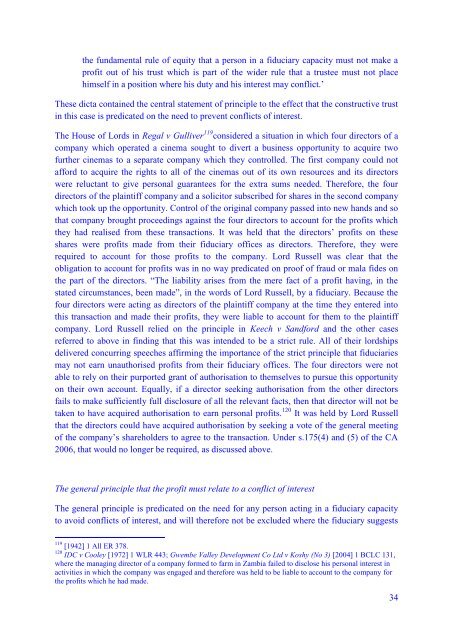Chapter 7 Directors' Duties - alastairhudson.com
Chapter 7 Directors' Duties - alastairhudson.com
Chapter 7 Directors' Duties - alastairhudson.com
Create successful ePaper yourself
Turn your PDF publications into a flip-book with our unique Google optimized e-Paper software.
the fundamental rule of equity that a person in a fiduciary capacity must not make a<br />
profit out of his trust which is part of the wider rule that a trustee must not place<br />
himself in a position where his duty and his interest may conflict.‟<br />
These dicta contained the central statement of principle to the effect that the constructive trust<br />
in this case is predicated on the need to prevent conflicts of interest.<br />
The House of Lords in Regal v Gulliver 119 considered a situation in which four directors of a<br />
<strong>com</strong>pany which operated a cinema sought to divert a business opportunity to acquire two<br />
further cinemas to a separate <strong>com</strong>pany which they controlled. The first <strong>com</strong>pany could not<br />
afford to acquire the rights to all of the cinemas out of its own resources and its directors<br />
were reluctant to give personal guarantees for the extra sums needed. Therefore, the four<br />
directors of the plaintiff <strong>com</strong>pany and a solicitor subscribed for shares in the second <strong>com</strong>pany<br />
which took up the opportunity. Control of the original <strong>com</strong>pany passed into new hands and so<br />
that <strong>com</strong>pany brought proceedings against the four directors to account for the profits which<br />
they had realised from these transactions. It was held that the directors‟ profits on these<br />
shares were profits made from their fiduciary offices as directors. Therefore, they were<br />
required to account for those profits to the <strong>com</strong>pany. Lord Russell was clear that the<br />
obligation to account for profits was in no way predicated on proof of fraud or mala fides on<br />
the part of the directors. “The liability arises from the mere fact of a profit having, in the<br />
stated circumstances, been made”, in the words of Lord Russell, by a fiduciary. Because the<br />
four directors were acting as directors of the plaintiff <strong>com</strong>pany at the time they entered into<br />
this transaction and made their profits, they were liable to account for them to the plaintiff<br />
<strong>com</strong>pany. Lord Russell relied on the principle in Keech v Sandford and the other cases<br />
referred to above in finding that this was intended to be a strict rule. All of their lordships<br />
delivered concurring speeches affirming the importance of the strict principle that fiduciaries<br />
may not earn unauthorised profits from their fiduciary offices. The four directors were not<br />
able to rely on their purported grant of authorisation to themselves to pursue this opportunity<br />
on their own account. Equally, if a director seeking authorisation from the other directors<br />
fails to make sufficiently full disclosure of all the relevant facts, then that director will not be<br />
taken to have acquired authorisation to earn personal profits. 120 It was held by Lord Russell<br />
that the directors could have acquired authorisation by seeking a vote of the general meeting<br />
of the <strong>com</strong>pany‟s shareholders to agree to the transaction. Under s.175(4) and (5) of the CA<br />
2006, that would no longer be required, as discussed above.<br />
The general principle that the profit must relate to a conflict of interest<br />
The general principle is predicated on the need for any person acting in a fiduciary capacity<br />
to avoid conflicts of interest, and will therefore not be excluded where the fiduciary suggests<br />
119 [1942] 1 All ER 378.<br />
120 IDC v Cooley [1972] 1 WLR 443; Gwembe Valley Development Co Ltd v Koshy (No 3) [2004] 1 BCLC 131,<br />
where the managing director of a <strong>com</strong>pany formed to farm in Zambia failed to disclose his personal interest in<br />
activities in which the <strong>com</strong>pany was engaged and therefore was held to be liable to account to the <strong>com</strong>pany for<br />
the profits which he had made.<br />
34













